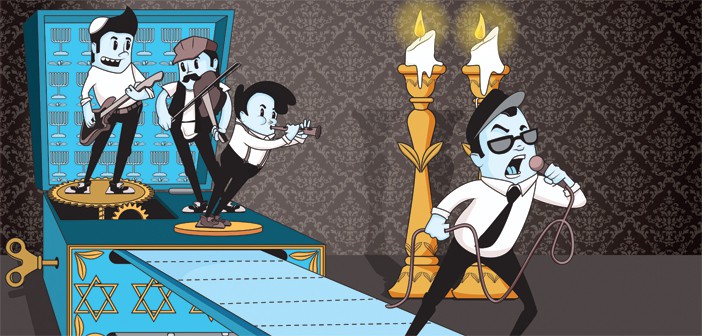“I’m Jewish because love my family Matzoh ball soup. I’m Jewish because my fathers mothers uncles grandmothers said ‘Jewish’, all the way back to Vitebsk & Kaminetz-Podolska via Lvov. Jewish because reading Dostoyevsky at 13 I write poems a restaurant tables LowerEast Side, perfect delicatessen intellectual. Jewish because violent Zionists make my blood boil, Progressive indignation. Jewish because Buddhist, my anger’s transparent hot air, I shrug my shoulders. Jewish because monotheist Jews Catholics Moselms’re intolerable intolerant — Blake sd. “6000 years of sleep” since antique Nobodaddy Adonai’s mind trap — OY! such Meshuggeneh absolutes — Senior Citizen Jewish paid my dues got half-fare card buses subways, discounts movie — Can’t imagine how these young people make a life, make a living. How can they stand it, going out in the world with only $10 and a hydrogen bomb?” [ Allen Ginsberg, Yiddishe Kopf ]
John Jeremiah Sullivan, one of the best writers in the American monthly GQ’s stable, once documented his visit to the biggest Jewish rock festival in the US, “Shemesh Florida.” This was an exemplary demonstration of sharp journalism from the perspective of deep embarrassment. Sullivan couldn’t have stood out more: a mistake by a lazy producer at the magazine resulted in Sullivan riding into the festival in an enormous RV instead of a modest van (festival-goers who choose not to camp out, opt to sleep in their cars). He wasn’t Jewish, or even close, and worse for the audience – he was an adult. He heard two different kids quietly repeating the consummate passive-aggressive phrase they must have learned from an aunt “I feel sorry for him.”
“I pretty much recognized the Chabadniks from my youth in New York,” Sullivan writes, “though everyone, I observed, had gotten better looking. Lots were dressed like skate punks or in last season’s East Village couture (Reform Jews). Others looked a little more rural. (Solidarity with hilltop youth? a Birthright tour that went too far?). A few looked like preppy college students (those would be the Conservative Jews, the ones who’d have the pot). The newly-religious and the strict observers were easily identified from afar, with their unchanging anti-fashion and their pale glum faces. When I asked one woman, later, how many she reckoned were white, she said, “Roughly 100 percent.” I did see some Asians and three or four blacks. They gave the distinct impression of having been adopted.” The rest of Sullivan’s adventures among the Pfeffermans and the Rottbergs, among the suburban JAPs and the stressed-out nerds, reads like an eighties version of the comedy “Fish out of water,” hitting unexpected emotional depths when Sullivan coincidentally connects with a group of muscular ultra-Orthodox men in their thirties from a tiny town in Minnesota. They are working poor, tradesmen who appear almost un-Jewish to Sullivan’s New York eye, but are actually more similar to their shtetl ancestors than any of those wealthy quartets who strung their names together into law partnerships. A temporary and odd friendship arises. They pass around an acoustic guitar and Sullivan is surprised to be the first to play Leonard Cohen for them.
I hate to disappoint, but almost everything you have read here was a blatant lie. To the best of my knowledge, Sullivan never visited a Jewish rock festival, and if he did, he did not write about, and if he did, it was certainly not “Shemesh Florida,” which I dreamed up. The above lines were freely rewritten from his article “Upon This Rock,” published in GQ in February 2004, after Sullivan attended the largest Christian rock festival in the US or the world, “Creation Festival.” The rural types weren’t looking for an adventure in a West Bank outpost, they were just Southern Baptists. The Chabadniks stood in for Evangelicals. If Sullivan were looking for weed, he wouldn’t have asked Conservative Jews but members of the Young Life Christian outreach ministry. His newfound shtetl-y friends from Minnesota were a bunch of blue-collar guys from West Virginia. (In a parenthetical comment I would add, my uneasiness in describing a series of stereotypical American Jews in the eyes of a reporter with an Irish last name, was nothing compared to the tremendous discomfort that overcame me when I realized that it hadn’t disturbed me at all to read stereotypes of poor white Americans.) I didn’t want to start with a trick. But the first result if you search for “Jewish Rock Festival” is a Jewish food festival held in Little Rock, Arkansas. There are also results for a JewishAmerican news site reporting on Tel Aviv’s Rock ‘N’ Roller Festival last summer, where The Pixies and Soundgarden performed. There is also an American film festival showing the first intifada drama “Rock the Casbah” (which was named after a song by The Clash, but has no other connection to rock n’roll). Far down the page, the hardy searcher will find two relevant but trivial results.
There is no Jewish rock festival and no Jewish rock industry.
A Christian farewell to God and lists of Jewish rockers
But what does it mean that this doesn’t exist? That there is no such genre? Genetics of creativity? A search for just “Jewish rock” brings up mostly listicles that have become a pseudo-journalism of their own, with “10 greatest Jewish rock stars of all times.” Most of the lists overlap: Bob Dylan (born Robert Allen Zimmerman, of course), Billy Joel, David Lee Roth (Van Halen’s vocalist), Lou Reed, Marc Bolan (T. Rex frontman and glam rock pioneer). A variation of the lists appearing on an MTV satellite site boasts the headline “Ten Artists You Didn’t Know Were Jewish” and includes Pink, Mark Ronson (who I personally saw wearing a black kippah at Amy Winehouse’s funeral in July 2011). This list too includes Dylan.
Of course, searching for “Christian Rock Festival” brings up many mentions, reviews and recommendations, but also buckets of mockery. Many bands downplay the Christian faith of their members to one extent or another. “We are Christians who play rock music, but not Christian rock,” they say. In the simplest terms, as far as the Christian rock industry is concerned, it operates – whether from theological or economic motives but usually both – to bring it to the drum- and guitar-hungry youth. The rock is there to translate Christianity into a young language, to make it cool. It is also hurt in the equation. Being labeled “Christian rock” is a harsh fate. “Creation” is large, but it is also a genre prison. So then why go looking for Jewish rock n’roll? Isn’t it better to praise being relieved of that unpleasant fate? How do we talk about this without becoming an annoying grandmother who takes some weird pride in one or another celebrity being Jewish? I don’t even have the much more common patriotic pride in an Israeli musician making it big abroad. So why do I constantly ponder the question posed by Gilad Kahane on the first album by his band Girafot: “Why is there no Jewish punk music?” Kahane answers himself: “Because we think twice instead of getting into it.”
More than that, what am I looking for and why? I am looking, in the broadest sense, for rock music written by a Jew or Jews that comments on the open questions of Jewish identity. The difficulty in defining the soughtafter Jewish rocker – is he religiously observant? A believer? Secular? Ethnic? – is also the fertile ground for the work itself. The best Christian rock group in my opinion (which has of course fought this definition every day of its existence) is Pedro the Lion. Frontman David Bazan’s first solo album includes a beautiful ballad called “In Stitches” in which he sings:
“I might as well admit it / Like I even have a choice / The crew had killed the captain / But they still can hear his voice / A shadow on the water / A whisper in the wind / On long walks with my daughter / Who is lately full of questions about you”.
It is a farewell song from God (that enraged many of Pedro the Lion’s faithful listeners). It is one of the few songs I know that deal with this subject, the most piercing of them. It is the final chord in a long chapter of Bazan’s religious misgivings and deliberations. And I search for my own Bazan.
The occupation of the Brill Building and the lack of a Jewish voice
Musically, rock developed from black American music from the early 20th century, like rhythm and blues and gospel, along with more “white” influences like folk and country. “Rock historians see it as a history of whitevs-black, but it is necessary to understand the ethnic basis of white America,” explains Dr. Ari Katorza, author of probably the only rock history written in Hebrew, “Tomorrow Never Knows.” Katorza wrote his doctoral thesis on the role of Jews in the development of American rock. “A lot of American music is created by minorities, but the concept ‘minority’ has also changed. In the beginning, it was the Irish. In the late 19th century, Jews from Eastern Europe got into the music industry, many through blackface, as described in the movie ‘The Jazz Singer.’
“Even before rock, Jews were well established in the music industry. The music publication industry in the US was established by Jewish entrepreneurs, followed by musicians like George Gershwin, Irving Berlin, and finally the great musical writers Rogers and Hammerstein. Even after World War II, in the early days of rock, Jewish entrepreneurs were heavily involved in early records, in the ‘Brill Building’ where major music producers Burt Bacharach and Phil Spector had offices. Until 1968, when the Beatles came to America.”
In other words, the Jews were in key roles in every aspect of the music industry. Like in literature, cinema, theater and stand-up comedy, but unlike in all those sectors, rock never had its own Woody Allen, Allen Ginsburg or Lenny Bruce, someone to deconstruct the urban, secular Jewish experience in the Diaspora, which insists on maintaining the perspective it brutally deconstructs. Lou Reed, for instance, wrote “Kill Your Sons” in 1974, in which he documents with cruel candor his experience after electroshock therapy in his teens:
“All you two-bit psychiatrists are giving you electroshock / They say they let you live at home with mom and dad / Instead of mental hospital / But every time you tried to read a book you couldn’t get to page 17 / ‘Cause you forgot where you were, so you couldn’t even read / Don’t you know / They’re gonna kill your sons.”
This song – like much of Reed’s work – is based on materials that “Portnoy’s Complaint” author Philip Roth could only dream of. Psychiatrists, the loss of the ability to read, the parents’ home as a substitute –though not really an alternative – to a mental institution. Against a backdrop of the harsh, violent treatment 14-year-old Reed underwent when his parents discovered his bisexuality. These cultural and aesthetic raw materials could be called Freudian: the meeting of the clichéd psychiatric jargon and the clichéd Jewish family language.
Many facets of the Freudian dialogue and its Jewish connection are arguable: is it a cliché with anti-Semitic roots, which presents the Jewish man as weak, submissive and neurotic, a sort of “Süss the Jew” of Nazi propaganda fame? Was it born of Diaspora Jewish communities absorbing the cliché? Maybe the causeresult relationship was the opposite and it was Freud, another urban, secular Diaspora Jew, who wrote global theories that fit the Jewish family, maybe too well? One way or another, one thing remains unchallenged: the centrality of Freudian aestheticism, including the intentionally transparent autobiographical foundation in the literary and cinematic works of many American Jews – or at least of those who became central voices in cinema and literature. To further complicate matters, one could wonder whether Woody Allen, Larry David or Philip Roth became so well loved by the mainstream because they embodied the neurotic Jewish stereotype, which played off the latent racism of the WASP audience. But none of that addresses the question of why that never happened in rock music.
“It is harder to analyze questions of Jewish identity through rock n’roll. In poetry – and the lyrical side of rock is poetry – the writing is less discursive,” says Jeremy Fogel, soloist for Israeli avant-garde band Pissuk Rachav, who holds a Ph.D. in Jewish philosophy. The provocative Pissuk Rachav has put out two albums with heavy religious motifs (including a song called “I am the Judonazi”), one under the Tzadik label owned by saxophonist John Zorn, which he says is “home to radical Jewish culture.” Among other things, Tzadik has released a series of tribute albums called “Great Jewish Music,” dedicated to Burt Bacharach, Serge Gainsbourg and Marc Bolan. “The writing is more implicit, there isn’t necessarily an analysis of the question. Even poets like Allen Ginsburg, even when they discuss Judaism, they don’t deconstruct it. This is a very different medium and there is no alternative to handling things in a different manner.”
It doesn’t seem like it bothers musicians to deconstruct or reconstruct elements of the Christian ethos in their music. “There too, they deal with symbols, although one could ask why Lou Reed sings about Jesus and not Moses. But the identity questions – who am I, as a secular Jew, what makes me Jewish – these are heavy and complex questions. I don’t know if rock manages to deconstruct the parallel questions regarding Christianity. In jazz, you find people dealing with their Jewish identity, from Benny Goodman through John Zorn, but with music, not lyrics. This depth of research isn’t natural for rock. As you go further to the margins, your findings will change. Marc Ribot – a guitarist for Tom Waits – wrote a stinging song on antiSemitism called ‘Yo! I Killed Your God.’”
“Writing rock n’roll is writing through black language,” Katorza insists. “It is impossible tounderstand the music except through that prism. In that sense, there are Jewish influences and biblical expressions – the fight for justice, the expansion of the American monolithicWASP culture into something multi-cultural. In many senses, the Jews tagged along behind the blacks and wrote rock from their perspective.” This is the moment to mention one of the opening scenes in “I’m Not There,” Todd Haynes’ experimental biographical film about Bob Dylan, where Dylan is played by an 11-year-old black boy. “Even in the sixties, when rock was the most open and liberal, it operated in a commercial world that moved in record stores. So there was no alternative to plugging in to the popular aesthetic. It was about a battle against the bourgeois world, a revolt against the old order, criticism of American fakery and shallowness. It was about opening America up to new voices, but not necessarily the Jewish voice.”
The rocker who arises in conversations with Fogel and Katorza may really not be in line with the neurotic New York Jew, who discusses his own identity. As Fogel says, until Dylan came on the scene, they dealt “mostly with women and cars” (writing that was dominant again in mainstream rock of the eighties, and had an ironic kind of renaissance in recent years). But rock has another bespectacled dynasty, of another kind of writer, the hyper verbal. The icons most identified with it are probably Elvis Costello and Pulp frontman Jarvis Cocker, but its forefather is Modern Lovers founder Jonathan Richman, who launched the careers of future members of Cars and Talking Heads. Although Richman’s writing didn’t deal with his ethnic origins, the character that stands out of the texts – and their performance – is more like a lost stereotypical Diaspora Jew or even one intentionally covered up by Jewish rockers. But from there, the history becomes a history of the place and not a history of the ethnic origins. In the seventies, mostly in New York, a scene developed that more intensely hybridized rock and high art and intellectualism. While the central punk stream continued to dress in leather coats and yell against the regime, the post-punk – and the New Wave born of it – regularly used the imagery of anxiety and helplessness along with a critical and rationalist perspective. “Some tied literature to rock n’roll – Dylan, Reed, Leonard Cohen, of course, Randy Newman. I have no doubt that this is part of Jewish tradition, Jewish education and the middle class, whose members didn’t connect to the sexual and less sophisticated messages that were rock n’roll at the time,” according to Katorza. “With Jonathan Richman and in punk there was really something neurotic, but still, none of the big artists, the leaders, really put their Judaism out there front and center. But there is a different America, through the eyes of someone who remained an outsider. He may be second- or thirdgeneration American, but he doesn’t feel entirely connected. He feels other.” Still, in keeping with Fogel’s comments on Marc Ribot, the rock soloist operating according to this aesthetic remained a possibility, an alternative, not a mainstream figure. Talking Heads was a great band, extremely influential for many – but did not become a template. When the eighties rocker – the macho extrovert – was replaced by the sensitive, complicated and wounded rocker of the nineties, intellectualism still did not take a starring role. Like the Ship of Theseus paradox, rock had replaced almost all its components a number of times over, retaining just two things: electric guitars and admiration for simplicity (except for the short and unusual flirtation with progressive rock, which in retrospect was marginal).
“Rockers are forced to hide behind the black, multi-cultural idea,” Kartoza says. At first, I’m overwhelmed with the drive to contradict this statement with a list of rock bands that grew out of the British and American extreme right, until I remember that these bands – even truly neo-Nazi iterations – operated in genres that had longstanding multi-cultural histories like punk, oi! (a sub-genre of punk popular in Britain in the eighties) and even ska, which grew out of reggae. Many now accuse rock of whitening and denying its black roots, arguing that Elvis “stole rhythm and blues.”
Strengthening the Zionist-Israeli link and weakening Jewish identity
At least the first of those two claims is not baseless, but rock’s individualist ethic – the constant emphasis on the soloist, even if the band doesn’t highlight his name – erases roots in general. It is a multi-culturalism of no origins, possibly stemming from the fact that rock – at least at its outset – was a community for outsiders. As it moved into the mainstream, with the establishment of events like the Creation festival, that role moved to punk, heavy metal and other marginal music scenes. That may be why it is so hard to write about ethnic limits in a rock song. Katorza and Fogel both mention repeatedly Dylan and Cohen as having touched on their religious-spiritual identities in their later works, but both artists underwent dramatic spiritual revolutions – Dylan’s Christian phase in the eighties, Cohen’s decade in a Buddhist monastery; their religious-spiritual identities were shaken to the point of becoming individual. Other artists, those mentioned here and others – Newman, Reed, Paul Simon, Richard Hell (an influential figure in early punk) – they do fit to some extent into the “perfect delicatessen intellectual” as Allen Ginsberg defined it, but it seems that in their songs themselves, they deconstructed anything but their ethnic origins. It would not be grating at all if the issue hadn’t become so dominant as to be a cliché among their Bohemian peers in cinema, literature and other works. The gap is far more grating than the lack.
But let’s return to Dylan and Cohen. The truth is that when most Israeli music journalists write about them, they emphasize their Israeli-Zionist context (Dylan’s political fable “Neighborhood Bully,” Cohen’s concert tour at the Sinai front during the Yom Kippur War) over the Jewish connection. However, in both cases, the Jewish references that can be extracted from their writings are almost always inherently biblical – Jewish, but also universal. To radicalize the already-absurd, and to shed further light on Dylan’s split identity at least in his early career, we can revisit his early song “Talkin’ Hava Negeilah Blues.” Dylan calls this a “foreign song” he learned in Utah, one of the most Christian states in the United States. Cohen too relied heavily on the Holy Scriptures, but in “Almost like the Blues,” from his early album “Popular Problems,” Cohen writes:
My father said I’m chosen / My mother said I’m not / I listened to their story / Of the Gypsies and the Jews / It was good, it wasn’t boring / It was almost like the blues Here he ties everything together with his typical simplicity: Judaism, being an outsider like a Gypsy, and the blues.
Words from scripture and outside the personal Jewish experience
Fogel, for whom digging through issues of both religious and secular Judaism is his intellectual home, admits that in his own work in “Pissuk Rachav” there is no real investigation of these matters, despite a heavy religious linkage to his work. “Rock as a medium has a certain energy, although there are exceptions. Rock is ecstatic. It isn’t suited to sitting and contemplating your identity. There is another energy – tragic, comic, but intellectual, not ecstatic (Fogel repeats the word “ecstatic” in describing the conceptual process behind the works by his band). Maybe people whose chemical makeup is inclined to investigate their Jewish identity will also be inclined to use music that is more associated with Judaism, like the Klezmatics, a modern klezmer band with rock influences or Israel’s own Habiluim.” But even abroad, the Jewish issue is represented by a band that seeks to reinterpret an anachronistic musical style, so it can anyway not be expected to obey the textual norms of rock n’roll.
In the case of Habiluim, their interest in Klezmer and Russian music jives with the cryptic, frozen time in their albums, which are both very modern and written in open response to Israeli reality, while existing in a sort of suspended, pseudoDiasporic past tense. The radicalization of these fundamentals in their music has made them deviant (although they are also one of the prominent rock bands in Israel in the past decade, always teetering on the fence between success and cult), but Katorza emphasizes that “Russian music fathered Israeli music, the connection to the East is what is refuted. Discussion of Israeli music is a debate on Israeliness versus Diaspora. On the one hand, there is the position of the Israeli government that seeks the native-born sabra, nature and the social justice of the prestate Palmach. This is where the first Israeli songs came from, and they are spiritually anti-Diaspora. But rock seeks to reconnect with the world and rejects this isolationism.”
It is interesting to see how despite their deep political distaste for the Palmach and this deepseated Israeliness, Habiluim are nonetheless drawn to the musical fundamentals of the period, which in turn, appear to release them from the esthetic cables of rock. In contrast, the longing for the Diaspora culture, for those musical fundamentals erased by the sabra ethos, does not develop into a discussion of an alternative Jewish identity other than the Israeli one. Habiluim deal with the Israeli reality in universal situations, and the Slavic and Yiddish foundations that appear in their works serve more as a means to disrupt reality. Although characters in the band’s songs are given grotesque Ashkenazi names like “Hilik Porcelina,” they are “disrupted Israeli” characters in the true style of playwright Hanoch Levin.
Another interesting phenomenon in Israeli music, is the way in which the Jewish essence seeps into it, despite the apparent absurdity, through ethnic musical phraseology. For Ehud Banai, this was dub and reggae, while other ensembles flirted with Balkan and Mediterranean sounds, but these were generally seen by music critics as “spice.” “This is also a counter-reaction to America,” Katorza explains, “and to a culture many in Israel see as shallow. Yes, electric guitars, but also depth from the ‘ethnic’ music angle,” a catalogue which in and of itself raises the question of the whiteness and rock’s black roots.
Another phenomenon is the “quote” symptom – Israeli rockers’ frequent, maybe even unprecedented in global terms, use of texts that are not original. These include “songs of the poets,” a stubborn plague in Israeli rock in the past two decades with roots as old as Israeli rock itself, but recently quite out of control. In the more recent past, we have also witnessed newly-religious musicians releasing albums based on biblical or scriptural texts – instead of writing about their own religious-spiritual experiences. A few, such as Shuli Rand and Adi Ran, have opened up their personal perspectives of these changes, but for the most part, this opportunity is missed.
But in American rock too, no Philip Roth is waiting in the wings right now. Those levels of introspection, social, ethical and cultural awareness are reserved for the rationalist hip-hop (where surprisingly enough, artists from the Beastie Boys to Matisyahu did touch on their Jewish identities at varying levels of intensity.) To some extent, the nihilistic essence of rock, from back in the days of legendary blues player Robert Johnson, who was said to have sold his soul to the devil in exchange for his inhuman mastery of the guitar, was the real driving force behind this self-examination. Rock, even when it is not very different from its previous generation, must pretend it has no mother or father. So it certainly cannot admit to having a people. This is a sacrifice, but one from which it draws some of its immediacy, the power of three minutes of guitar-bassdrums that has no parallel anywhere in world culture. Or, as Fogel told me, a moment before our conversation ended: “In the end, a song is a prayer. It is not a meta. And it doesn’t matter who you pray to if it is Leonard Cohen’s ‘Hallelujah’ or Marvin Gaye’s ‘Let’s Get It On.’ It isn’t analysis of, isn’t thoughts on, it is the experience. The thing itself.” So how do you write a Jewish punk song? Maybe there is no way out but to get into it instead of thinking twice.








